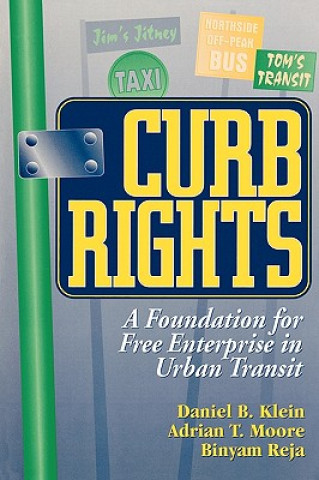
Kód: 04727966
Curb Rights
Autor Daniel B. Klein, etc.
Transit services in the United States are in trouble. Ridership has dwindled, productivity has declined, and operating deficits have widened. The traditional approaches to running transit systems--government planning or operation ... celý popis
- Jazyk:
 Angličtina
Angličtina - Väzba: Brožovaná
- Počet strán: 164
Nakladateľ: Brookings Institution, 1996
- Viac informácií o knihe

Mohlo by sa vám tiež páčiť
-

H.G. Wells Reader
21.66 € -

Topsy and Tim: Visit London
6.84 € -23 % -

Taking a Different Tack
34.53 € -

Neo-Adjuvant Chemotherapy
174.75 € -

Little Book of Role Play
13.38 € -

Bovine Neonatology, An Issue of Veterinary Clinics: Food Animal Practice
91.87 € -

Sunday Best
21.15 € -

Landscapes of the Ethnic Economy
75.82 € -

Japanese
123.55 € -

Muay Thai Counter Techniques
33.31 € -15 % -

L: Income Distribution
270.41 € -

Johann Gottwerth Muller (Von Itzehoe)
69.38 € -

Lobster Is the Best Medicine
13.68 € -21 % -

Battle of Hackham Heath
8.98 € -23 % -

Telling Tales
19.20 € -6 % -

Sourcebook on Environmental Law
59.57 € -

Ulysses
4.59 € -25 % -

Call the Dead Again (Mitchell & Markby 11)
12.56 € -13 % -

New Larousse Gastronomique
80.42 € -18 % -

Alfie
25.13 € -

Handbuch Porsche 911 SC
55.89 € -4 % -

DB Private Venture Capital Investors Directory - III - 2014
89.93 € -

Orgelmusik zum Ende des Kirchenjahres, Partitur
34.53 € -8 % -

Die Verfassungsbeschwerde Nach Der Bayerischen Verfassung Von 1818 (1818-1848)
83.69 € -

Bilingualer Unterricht Im Fokus Der Biologiedidaktik
64.48 € -

Die ewige Suche des Menschen
19.31 € -4 % -

Brauchen Migranten Eine Andere Pflege?
15.52 € -

Fachdidaktik mundlich. Lernzusammenfassung fur Staatsexamen Deutsch
10.62 €
Darčekový poukaz: Radosť zaručená
- Darujte poukaz v ľubovoľnej hodnote, a my sa postaráme o zvyšok.
- Poukaz sa vzťahuje na všetky produkty v našej ponuke.
- Elektronický poukaz si vytlačíte z e-mailu a môžete ho ihneď darovať.
- Platnosť poukazu je 12 mesiacov od dátumu vystavenia.
Viac informácií o knihe Curb Rights
Nákupom získate 89 bodov
 Anotácia knihy
Anotácia knihy
Transit services in the United States are in trouble. Ridership has dwindled, productivity has declined, and operating deficits have widened. The traditional approaches to running transit systems--government planning or operation of bus and rail services, government subsidization of private operations, heavy regulation of all transit modes--have failed, and there is little hope of their ever succeeding under current practices. But public transportation cannot simply be abandoned. Can it, then, be made more self-supporting and efficient? The authors of this book say it's time to rethink the fundamental structure of transit policy. The book focuses on street-based transit--buses, shuttles, and jitneys. (While street-based transit in the U.S. today usually means bus service, in other times and places streets have also been served by smaller vehicles called jitneys that follow a route but not a schedule.) The authors examine a variety of transit services: jitney services from America's past, illegal jitneys today, airport shuttle van services, bus deregulation in Great Britain, and jitney services in less developed countries. The authors propose that urban transit be brought into the fold of market activity by establishing property rights not only in vehicles, but also in curb zones and transit stops. Market competition and entrepreneurship would depend on a foundation of what they call " curb rights." By creating exclusive and transferable curb rights (to bus stops and other pickup points) leased by auction, the authors contend that American cities can have the best of both kinds of markets--scheduled (and unsubsidized) bus service and unscheduled but faster and more flexiblejitneys. They maintain that a carefully planned transit system based on property rights would rid the transit market of inefficient government production and overregulation. It would also avoid the problems of a lawless market--cutthroat competition, schedule jockeying, and even curbside conflict among rival operators. Entrepreneurs would be able to introduce ever better service, revise schedules and route structures, establish connections among transit providers, and use new pricing strategies. And travelers would find public transit more attractive than they do now. Once the system of curb rights is sensibly implemented, the authors conclude, the market process will take over. Then the invisible hand can do in transit what it does so well in other parts of the economy.
 Parametre knihy
Parametre knihy
Zaradenie knihy Knihy po anglicky Technology, engineering, agriculture Transport technology & trades Automotive technology & trades
36.07 €
- Celý názov: Curb Rights
- Podnázov: A Foundation for Free Enterprise in Urban Transit
- Autor: Daniel B. Klein, etc.
- Jazyk:
 Angličtina
Angličtina - Väzba: Brožovaná
- Počet strán: 164
- EAN: 9780815749394
- ISBN: 0815749392
- ID: 04727966
- Nakladateľ: Brookings Institution
- Hmotnosť: 333 g
- Rozmery: 229 × 152 × 9 mm
- Dátum vydania: 30. December 1996
Obľúbené z iného súdka
-

Basic Course in Race Car Technology
71.84 € -

Race Car Aerodynamics
41.18 € -19 % -

Illustrated Encyclopedia of Trucks
24.82 € -6 % -

Toyota Land Cruiser (68 - 82)
41.18 € -4 % -

Chevrolet Corvette (68 - 82)
41.69 € -18 % -

Mercedes-Benz 350 & 450 (71 - 80)
41.59 € -3 % -

H-D Panheads 48-65
45.88 € -5 % -

Race Car Design
80.52 € -5 % -

How to Build, Modify & Power Tune Cylinder Heads Updates &
27.38 € -23 % -

Ford Mustang V8 (July 64 - 73)
43.43 € -

Professional Sheet Metal Fabrication
38.72 € -6 % -

SAAB
11.95 € -

Design and Simulation of Four-Stroke Engines
130.19 € -

How to Build a Cheap Chopper
25.64 € -17 % -

Race Car Vehicle Dynamics
119.57 € -

Porsche 944 (83 - 89)
48.54 € -5 % -

Comprehensible Guide to J1939
17.16 € -19 % -

Modern Automotive Technology
64.17 € -

Maximum Boost
67.85 € -4 % -

Machine That Changed the World
52.01 € -6 % -

Scientific Design of Exhaust and Intake Systems
58.35 € -4 % -

Speed Read Porsche 911
16.55 € -23 % -

Optimising Car Performance Modifications
16.55 € -23 % -

Dodge Caravan, Plymouth Voyager and Chrysler Town and Countr
46.18 € -10 % -

Automotive Master Technician
55.69 € -2 % -

Ford Pick Ups & Bronco (73 - 79)
41.69 € -2 % -

Honda CB650 Sohc Fours (78 - 84)
42.20 € -15 % -

Citroen C15 Van Petrol & Diesel (89 - Oct 98) F To S
32.59 € -20 % -

Volvo 120 and 130 Series Owner's Workshop Manual
43.43 € -15 % -

Car Suspension
67.95 € -

Datsun 240Z, 260Z & 280Z (70 - 78)
43.43 € -15 % -

Gears and Gear Cutting
8.98 € -23 % -

Honda V45/65 Sabre & Magna (82 - 88)
42.20 € -15 % -

Norton Commando (68 - 77)
42.20 € -15 % -

Jaguar E-Type 3.8/4.2 Series 1 and 2 Workshop Manual
134.08 € -

Honda GL1000 Gold Wing (75 - 79)
42.20 € -15 % -

Jaguar XJS12 (and HE Supplement) 1975 to Mid 1995 Workshop Manual
134.08 € -

Fiat 124 Sport Coupe & Spider (68 - 78)
48.54 € -5 % -

Tuning The A-Series Engine
48.94 € -23 % -

Yamaha XT, TT & SR500 Singles (75 - 83)
39.95 € -20 % -

Honda CB750 & CB900 Dohc Fours (78 - 84)
47.21 € -4 % -

Sheet Metal Shaping
29.73 € -18 % -

H-D Shovelheads 66-84
45.88 € -5 % -

Yamaha XS750 & 850 Triples (76 - 85)
39.95 € -20 % -

Honda XL/XR 250 & 500 (78 - 84)
42.20 € -15 % -

Motorcycle Tuning Two-Stroke
62.03 € -

Scania 113 and 143 at Work
37.80 € -

Yamaha XJ650 & 750 Fours (80 - 84)
42.20 € -15 % -

BMW 1500, 1502, 1600, 1602, 2000 & 2002 (59 - 77) Up To S *
46.18 € -10 %
Osobný odber Bratislava a 2642 dalších
Copyright ©2008-24 najlacnejsie-knihy.sk Všetky práva vyhradenéSúkromieCookies



 21 miliónov titulov
21 miliónov titulov Vrátenie do mesiaca
Vrátenie do mesiaca 02/210 210 99 (8-15.30h)
02/210 210 99 (8-15.30h)